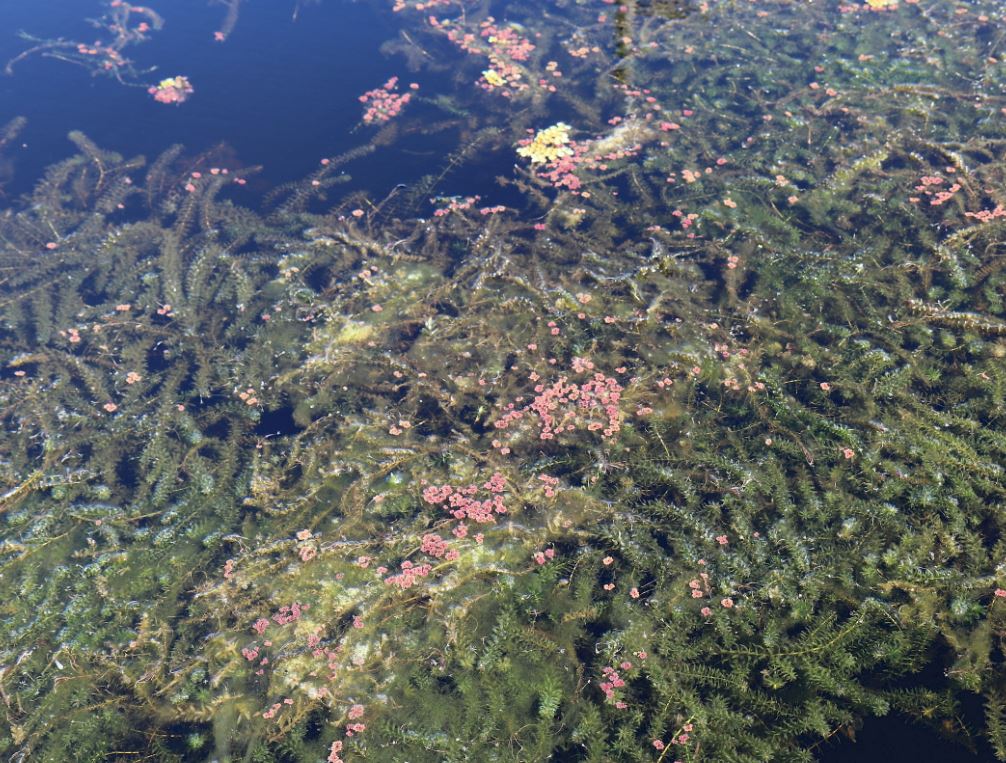
- News & Publications
- News
- Support
- About Us
- Education
- Research
- Research Programs
- Herbarium
- Library & Special Collections
- About the Library
- Library Exhibitions
- The Arader Natural History Collection of Art
- The Stansbery Collection for Botanical Art
- Rare Book Room Collection
- The Oliver G. Burk Children’s Collection
- History of the Library
- Library Inventory
- Library Archives Collection
- Archive Lens
- Collections Lens
- Botany Stories
- Discovery Resources
- Participate
- BRIT Press
- Research Resources
- Collections
April Lunchtime Lecture: Practical Testing for Hydrilla Control
“Employing a New Testing Method for Identifying Fluridone Resistance in Hydrilla”
A Hybrid Lunchtime Lecture by Ulysses Oles
The issue of invasive plants in the United States is one that contributes to serious environmental and financial stress, and Hydrilla verticillata is among the most problematic of these species. Hydrilla infestations when left unchecked can choke out freshwater bodies, resulting in fish kills and limiting the capacity for human use in recreational and commercial activities. Although removal of hydrilla can be complicated due to the ease with which it reproduces and a general resilience to environmental stressors, control has historically been viable through the use of chemical herbicides. Fluridone is a phytoene desaturase inhibitor that has been seen for decades as one of the most effective and safest ways to manage problematic hydrilla. Unfortunately, hydrilla plants have started to develop resistance to fluridone use in the form of three mutations found in the same codon of the pds gene associated with the production of phytoene desaturase. Fluridone resistant mutants are outwardly indistinguishable from their more susceptible counterparts, and it is for this reason that it is important to have methods of testing for fluridone resistance beyond visual confirmation. My thesis proposed the use of double-mismatch allele-specific qPCR (DMAS-qPCR) as a potentially fast and cost-effective tool for replacing existing methods of identifying fluridone resistance in the hopes of streamlining the process for aquatic systems managers. After testing dozens of samples collected from waterways throughout Florida, I believe that DMAS shows great promise as a practical tool for resistance screening, and that further refinement of the method would allow for quick and cost-effective identification of fluridone resistant hydrilla in a practical setting.
This is a free hybrid seminar. Please join us in person in the Commons of the BRIT Building or virtually via the following link: https://us06web.zoom.us/j/82755024484.
About the Research Lecture Series
The BRIT Research Lecture Series is designed to create community wide conversation about a diverse range of important and rapidly developing topics. This series gives scientists and speakers a forum for sharing the most current information about their areas of expertise and allows the public to interact with leading members of the local, national, and international scientific community. Read more at fwbg.org/events/lecture-series.
Date
- Apr 02 2024
- Expired!
Time
(online)- 12:00 pm - 1:00 pm

April Lunchtime Lecture: Practical Testing for Hydrilla Control
Date
- Apr 02 2024
- Expired!
Time
(online)- 12:00 pm - 1:00 pm
“Employing a New Testing Method for Identifying Fluridone Resistance in Hydrilla”
A Hybrid Lunchtime Lecture by Ulysses Oles
The issue of invasive plants in the United States is one that contributes to serious environmental and financial stress, and Hydrilla verticillata is among the most problematic of these species. Hydrilla infestations when left unchecked can choke out freshwater bodies, resulting in fish kills and limiting the capacity for human use in recreational and commercial activities. Although removal of hydrilla can be complicated due to the ease with which it reproduces and a general resilience to environmental stressors, control has historically been viable through the use of chemical herbicides. Fluridone is a phytoene desaturase inhibitor that has been seen for decades as one of the most effective and safest ways to manage problematic hydrilla. Unfortunately, hydrilla plants have started to develop resistance to fluridone use in the form of three mutations found in the same codon of the pds gene associated with the production of phytoene desaturase. Fluridone resistant mutants are outwardly indistinguishable from their more susceptible counterparts, and it is for this reason that it is important to have methods of testing for fluridone resistance beyond visual confirmation. My thesis proposed the use of double-mismatch allele-specific qPCR (DMAS-qPCR) as a potentially fast and cost-effective tool for replacing existing methods of identifying fluridone resistance in the hopes of streamlining the process for aquatic systems managers. After testing dozens of samples collected from waterways throughout Florida, I believe that DMAS shows great promise as a practical tool for resistance screening, and that further refinement of the method would allow for quick and cost-effective identification of fluridone resistant hydrilla in a practical setting.
This is a free hybrid seminar. Please join us in person in the Commons of the BRIT Building or virtually via the following link: https://us06web.zoom.us/j/82755024484.
About the Research Lecture Series
The BRIT Research Lecture Series is designed to create community wide conversation about a diverse range of important and rapidly developing topics. This series gives scientists and speakers a forum for sharing the most current information about their areas of expertise and allows the public to interact with leading members of the local, national, and international scientific community. Read more at fwbg.org/events/lecture-series.
